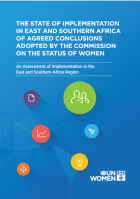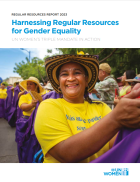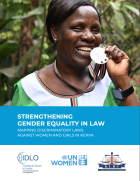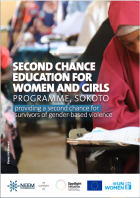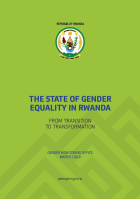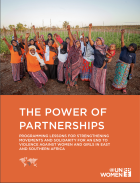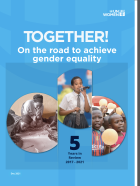1 - 20 of 34 Results
Pagination
Date:
The Commission on the Status of Women (CSW) monitors gender equality commitments and the Beijing Declaration. A study by UN Women East and Southern Africa assessed CSW63–CSW66, finding strong treaty ratification but weak policy implementation. Challenges include inadequate funding, weak national preparations, and limited African influence in CSW negotiations. Recommendations include strengthening coordination, enhancing stakeholder engagement, and improving CSO participation to boost Africa’s impact in global gender equality discussions.
Date:
The UN Women Kenya Annual Report highlights key achievements in advancing women’s empowerment and gender equality.
This report showcases progress in increasing women’s leadership and political participation, strengthening economic empowerment, eliminating violence against women and girls, engaging women in peace and security efforts, and enhancing planning and coordination.
UN Women Kenya remains dedicated to building a future where women are at the heart of developing resilient and sustainable communities.
Date:
The report demonstrates how regular resources are invested to advance integrated triple mandate results. This includes explicit recognition of the expertise and leadership of UN Women staff, which relies on regular resources investments. Country, regional, and global examples illustrate how regular resources, often together with other resources, build momentum in synergy to deliver important advancements for women and girls.
Date:
This report highlights some encouraging advancements. The information presented in this report is based on the latest available data (as of June 2024) on selected indicators in the global indicator framework for the Sustainable Development Goals.
Date:
Under the leadership of the Ministry of Gender, Child, and Social Welfare, in collaboration with the Ministry of Peace Building, and with support from UN Women and international funding, the Women’s Charter empowers women and girls to engage with the Reconstituted National Constitutional Review Commission (R-NCRC). Launched on May 29, 2024, in Juba, the Charter addresses twelve critical themes, advocating for comprehensive legal, policy, and programmatic interventions in the Permanent Constitution-making process.
Date:
UN Women and International Development Law Organization (IDLO), in partnership with the Kenya Law Reform Commission. Researcher/writer: Dr. Consolata Ngondi; Ms. Petronella Mukaindo
Date:
This Regional Coordination Strategy articulates how UN Women will leverage its unique triple mandate—encompassing normative support, UN system coordination, and operational activities—to mobilize urgent and sustained action to achieve gender equality and the empowerment of all women and girls and support the achievement of the 2030 Agenda.
Date:
Under the Joint UN-EU Spotlight initiative, the Second Chance Education center for Women and Girls, Sokoto, was established to ensure GBV survivors in Sokoto get a second chance at economic empowerment and basic education. This document highlights some of the human impact stories made by the Joint UN-EU Spotlight initiative in Sokoto
Date:
This Report presents the Africa Shared Research Agenda (ASRA) for ending gender-based violence (GBV), which was developed though a collaboration between UN Women Africa and the Sexual Violence Research Initiative. The ASRA is a set of research priorities for the field, developed through a participatory and consultative process and aims to inform investments in research over the coming 5-10 years for ending GBV in Central, East, Southern and West Africa.
Date:
This publication highlights the progress and prevailing gender gaps in Rwanda so far as far as Gender Equality and Women's Empowerment is concerned. It also gives insights into the state of gender equality in the National Strategy for Transformation (NST1) pillars.
Date:
This report presents the findings and recommendations from UN Women’s qualitative research on joint initiatives for ending violence against women and girls (EVAWG) implemented between 2016-2022 in East and Southern Africa (ESA).
Date:
The Annual Report captures the work of UN Women in Zimbabwe to accelerate Gender Equality and Women's Empowerment in Zimbabwe. It highlights the organisation's initiatives, challenges and milestones achieved in 2021.
Date:
The five years in review publication captures the progress made from 2017 to 2021 across its different focus areas: Leadership and Political Participation, Women’s Economic Empowerment, Ending Violence Against Women, Data and Statistics, HIV/AIDS and the response to the unfolding crisis caused by the COVID-19 pandemic.
Date:
This analytical study covered ten countries in the region and looked at issues of access to justice for women and girls in East and Southern Africa.
Date:
This report highlights UN Women Nigeria’s work for the year 2020. The report builds around the Nigeria Country Office programmatic areas of intervention and reflects the achievements attained in collaboration with various government and non-governmental partners who contributed to policy advocacy efforts, delivery of services, implementation, and funding of interventions aimed at promoting gender equality and women’s empowerment. The population at large (men, women, boys...
Date:
The purpose of this study was to develop a variety of texts documenting case studies of good and promising practices in the area of the protection of rights and access to services for women with disabilities in East and Southern Africa (ESA) during the COVID-19 pandemic.
Date:
The UN Women WCARO annual report aims to share information about the regional office's activities on women empowerment and gender equality in 2020. The said year has been a particularly difficult year around the world with the COVID-19 pandemic. In West and Central Africa (WCA), women and girls were particularly vulnerable to the crisis. To counter these burdens and build medium and long- term recovery measures, the UN Women WCA Regional Office successfully provided multi-faceted assistance...
Date:
UN Women Kenya Annual report aims to share the results and lessons learned for 2020.
Date:
This continental study provides a contextual analysis of the forced displacement of women and girls in Africa based on first hand data from field visits made to the Central African Republic, Ethiopia, and Nigeria. The analysis provides the key priority considerations for the realisation of durable solutions for refugees, IDPs and returnees in Africa and makes recommendations for actions by the AU, Member States and relevant stakeholders within the context of AGA and APSA.
Date:
The newsletter aims to serve as an information-sharing platform to promote accelerated action for Gender Equality and Empowerment of Women (GEWE) in Africa. The newsletter features good practices, knowledge, and efforts by the AUC, ECA, and UN Women that help ensure Gender Equality and Empowerment of Women in Africa is sustained.

